Languages
Vile and Filthy Morse Code
January 1945: Residents of Halifax complained to the police that people were driving around at night and using their horns to signal "vile and filthy language" in morse code.So it wasn't the honking, per se, that bothered the residents, but what the honks meant. Guess it was a different time, when a significant number of people actually understood morse.
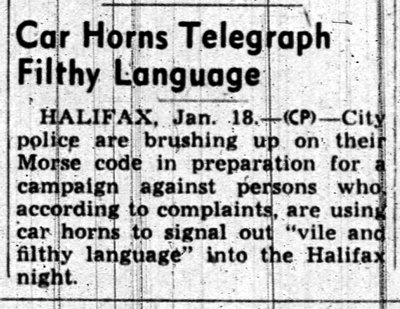
Ottawa Journal - Jan 18, 1945
Posted By: Alex - Fri Dec 09, 2016 -
Comments (6)
Category: Languages, 1940s
Let’s Say It Right
In October 1969, the U.S. Command in Vietnam issued a directive titled "Let's Say it Right" to the American Forces Vietnam Network (AFVN). The directive forbid military press officers from using certain terms and provided a list of acceptable terms in their place.For instance, instead of referring to "free firing zones" in which anything that moved was considered enemy and could be fired at, officers were supposed to say "pre-cleared firing zones." And instead of "lull" they were supposed to refer to "light and scattered action."
A military spokesman said that the directive was actually just a "style sheet" whose purpose was to "get everyone using similar words."
Some more of the "no-no" words (as AFVN officers described them) were listed in this NY Times piece:
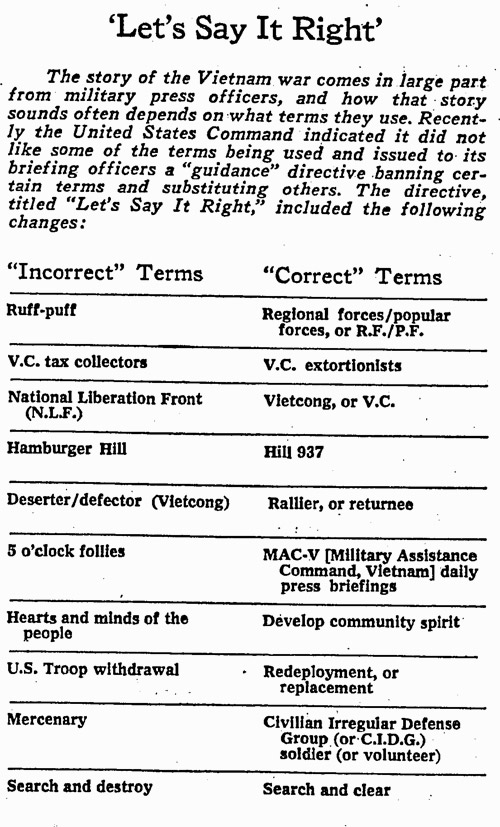
New York Times - Jan 11, 1970
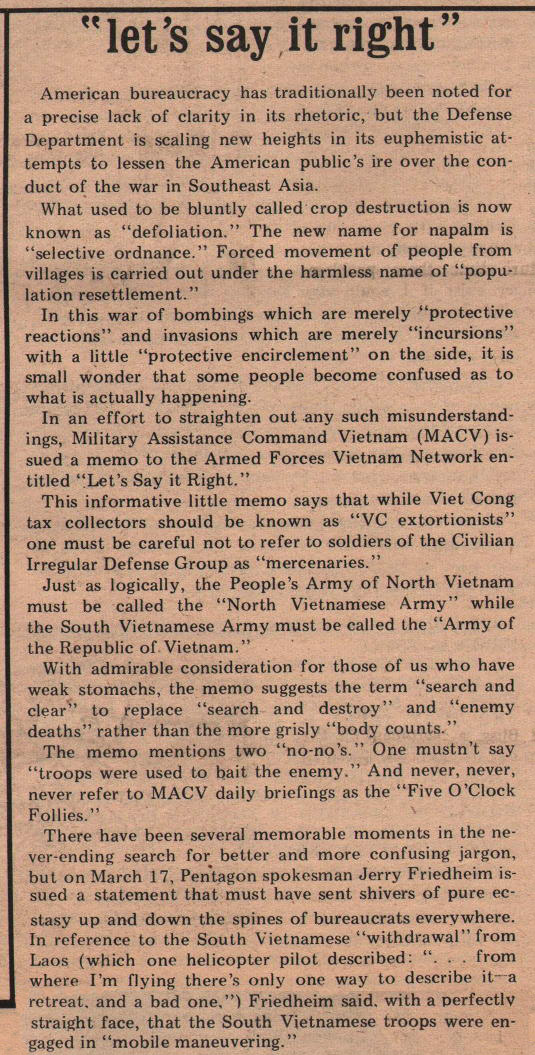
GI Press Service - April 1971
Posted By: Alex - Fri Nov 04, 2016 -
Comments (5)
Category: Languages, Military, 1960s
1960’s Beatnik Glossary
Contributed by "hotsauce269".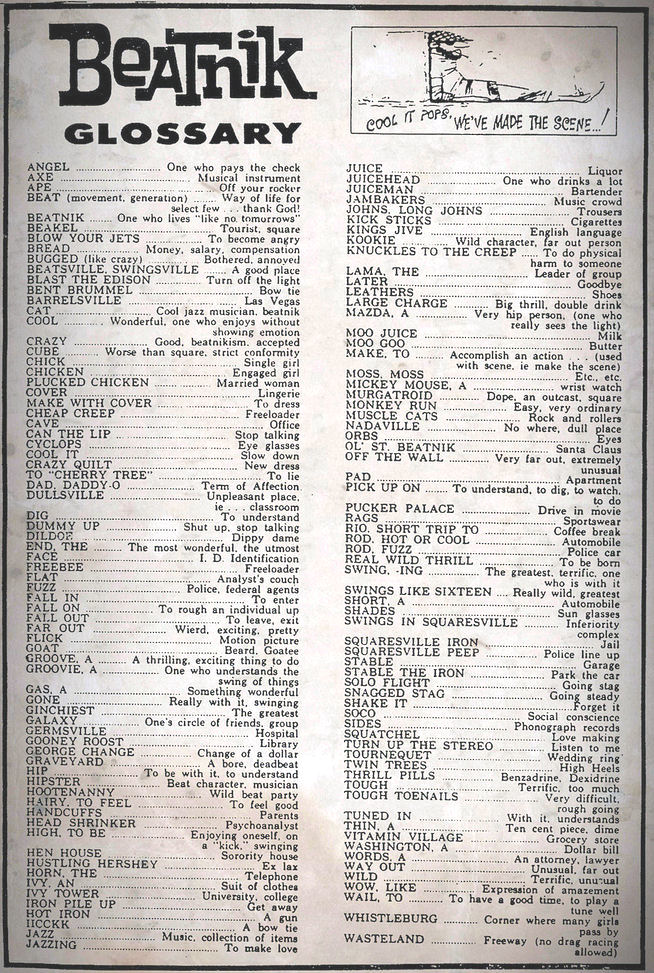
Posted By: Alex - Fri Oct 28, 2016 -
Comments (4)
Category: Languages, Slang, 1960s
Proper storage of warheads
A classic example of "officialese," which came to light in 1951. Text from a Royal Navy instruction manual on the proper storage of torpedo warheads:
The Decatur Herald - Aug 30, 1951

Green Bay Press-Gazette - Apr 22, 1962
Posted By: Alex - Thu Oct 27, 2016 -
Comments (4)
Category: Government, Regulations, Languages
The Royal Handbag Code

While on a lecture tour of the United States in 1990, Raymond Fullager, an expert on the British royal family, revealed the existence of a royal handbag code. According to him, the Queen of England used her purse to communicate secret signals to her staff.
Fullager claimed to have identified 23 different signals she used. For instance, if she moved her purse from her right to her left arm it meant that she was bored and needed to be rescued. A lady-in-waiting would then approach and say, "I'm afraid, ma'am, that you are running 10 minutes behind schedule."
If the handbag was securely gripped on her left arm, it meant that all was well.
Fullager refused to reveal all 23 signals, insisting that they needed to be kept a royal secret. But he did share some of the Queen's other body-language code. For instance, if she rubbed the middle finger on her left hand, it meant that a spectator was getting too close.
However, other royal experts were skeptical of Fullager's handbag-code theory. Gossip columnist Nigel Dempster declared that the code theory was "silly" and "just rubbish."
Andrew Morton said, "Frankly, you've got to wonder if anyone can actually do 23 different things with a handbag."
More info: Philly.com (Sep 14, 1990)

LA Times - Aug 8, 1990
Posted By: Alex - Tue Aug 23, 2016 -
Comments (4)
Category: Languages, Royalty
Jackety Jack
Your language lesson for the day.
Posted By: Paul - Wed May 25, 2016 -
Comments (4)
Category: Languages, Music, 1950s
The Flower Language Ebito
Dr. Akiki K. Nyabongo was an East African prince who lived in Brooklyn and had an ambition to write a book about Ebito, or flower language, which was "a symbolic method of communication among his compatriots, involving the use of flowers, leaves, grass, seeds, twigs, clay, beads, animal hair, and stones." (New Yorker - Jan 26, 1952).I don't think his book was ever published. However, he did author a short article (below) about the Flower Language, which ran in the journal Folklore (Dec 1938).
According to this article, if you give someone a piece of Asparagus puberulus it means:
Translation:



Posted By: Alex - Sat May 14, 2016 -
Comments (1)
Category: Languages
Where Weird Comes From
All you ever wanted to know about the history of the word 'weird.'
Posted By: Alex - Sun Apr 24, 2016 -
Comments (3)
Category: Languages
Official Language of the State of Illinois
June 19, 1923: The State of Illinois passed an act declaring "American" (as opposed to "English") to be the state's official language.The act was proposed by Senator Frank J. Ryan of Chicago who was "fed up" with American being called English. Ryan, in turn, got the idea from Montana Congressman Washington McCormick, who had tried, but failed, to get American designated as the national language.
In 1969 the Illinois legislature revised the statute to make English, not American, the official state language.
More info: languagepolicy.net

The Bend Bulletin (Bend, Oregon) - Jan 31, 1923
Posted By: Alex - Mon Mar 14, 2016 -
Comments (20)
Category: Languages, 1920s
Heaveno!
Leonso Canales of Kingsville, Texas began his campaign to replace the greeting "Hello" with the less satanic "Heaveno" in 1988, but he got really serious about it in 1997 when he placed ads in the local paper showing the word "Hello" scratched out and replaced with "Heaveno." That same year, his campaign received official support when the commissioners of Kleberg County voted unanimously to designate "Heaveno" as the county's official greeting.Canales died in Sep 2014, and with his departure the wind seems to have been taken out of the sails of the Heaveno movement. The website heaveno.com has been abandoned (although the old site is preserved in the Wayback Machine).
The Encyclopedia of American Loons includes a brief entry about Canales, and his son posted a memorial to him on YouTube (embedded below).

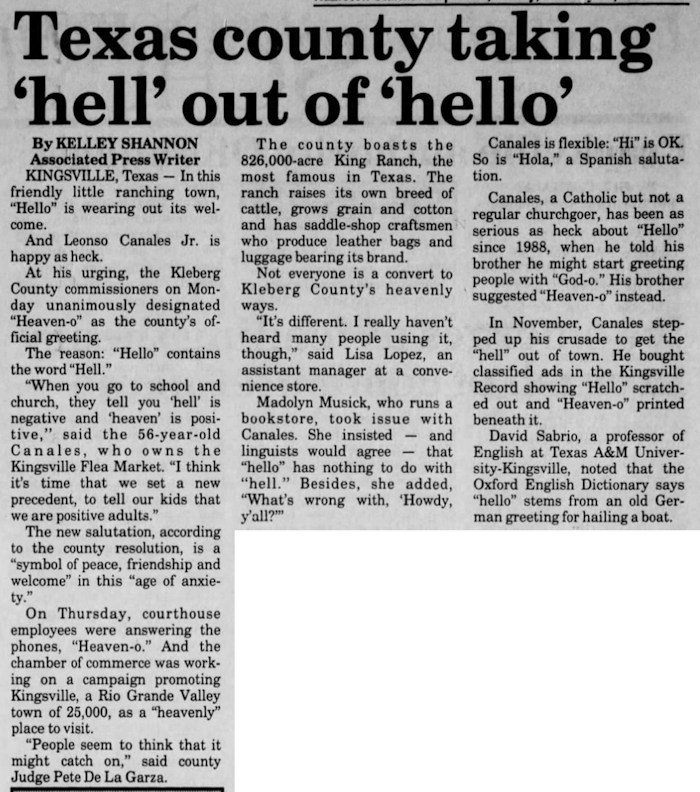
Standard-Speaker (Hazleton, Pennsylvania) - Jan 17, 1997
Posted By: Alex - Mon Dec 07, 2015 -
Comments (5)
Category: Languages, Religion, 1990s

| Who We Are |
|---|
| Alex Boese Alex is the creator and curator of the Museum of Hoaxes. He's also the author of various weird, non-fiction, science-themed books such as Elephants on Acid and Psychedelic Apes. Paul Di Filippo Paul has been paid to put weird ideas into fictional form for over thirty years, in his career as a noted science fiction writer. He has recently begun blogging on many curious topics with three fellow writers at The Inferior 4+1. Contact Us |




